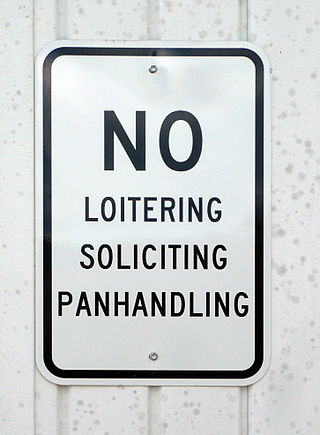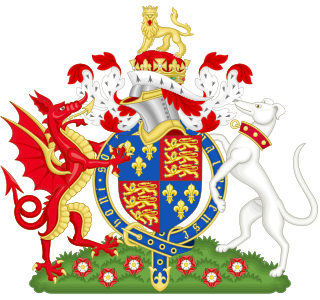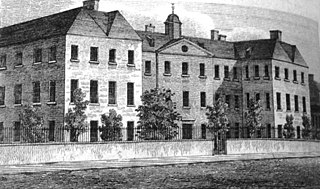
The English Poor Laws were a system of poor relief in England and Wales that developed out of the codification of late-medieval and Tudor-era laws in 1587–1598. The system continued until the modern welfare state emerged after the Second World War.

Begging is the practice of imploring others to grant a favor, often a gift of money, with little or no expectation of reciprocation. A person doing such is called a beggar or panhandler. Beggars may operate in public places such as transport routes, urban parks, and markets. Besides money, they may also ask for food, drink, cigarettes or other small items.
The Abraham-men were a class of beggars claiming to be lunatics allowed out of restraint, in the Tudor and Stuart periods in England.

A Caveat or Warning for Common Cursitors, vulgarly called vagabonds was first published in 1566 by Thomas Harman, and although no copies of that edition survive, it must have been popular, because two printers were punished by the Stationers' Company in 1567 for pirated editions. Two editions were published in 1568, and a revised edition in 1573. It is one of the fundamental texts for rogue literature.

Loitering is the act of standing or waiting around idly without purpose in some public places.

In English and British history, poor relief refers to government and ecclesiastical action to relieve poverty. Over the centuries, various authorities have needed to decide whose poverty deserves relief and also who should bear the cost of helping the poor. Alongside ever-changing attitudes towards poverty, many methods have been attempted to answer these questions. Since the early 16th century legislation on poverty enacted by the Parliament of England, poor relief has developed from being little more than a systematic means of punishment into a complex system of government-funded support and protection, especially following the creation in the 1940s of the welfare state.

The Vagabonds Act 1597 was an Act of the Parliament of England, which aimed to address concerns of vagrancy.
A Jovial Crew, or the Merry Beggars is a Caroline era stage play, a comedy written by Richard Brome. First staged in 1641 or 1642 and first published in 1652, it is generally ranked as one of Brome's best plays, and one of the best comedies of the Caroline period; in one critic's view, Brome's The Antipodes and A Jovial Crew "outrank all but the best of Jonson."

Vagrancy is the condition of wandering homelessness without regular employment or income. Vagrants usually live in poverty and support themselves by travelling while engaging in begging, scavenging, or petty theft. In Western countries, vagrancy was historically a crime punishable with forced labor, military service, imprisonment, or confinement to dedicated labor houses.

The Vagrancy Act 1824 is an Act of Parliament of the United Kingdom that makes it an offence to sleep rough or beg in England and Wales. The legislation was passed in Georgian England to combat the increasing number of people forced to live on the streets due to the conclusion of the Napoleonic Wars and the social effects of the Industrial Revolution. Critics of the law included politician and abolitionist, William Wilberforce, who condemned the Act for making it a catch-all offence for vagrancy with no consideration of the circumstances as to why an individual might be homeless.
The Tudor poor laws were the laws regarding poor relief in the Kingdom of England around the time of the Tudor period (1485–1603). The Tudor Poor Laws ended with the passing of the Elizabethan Poor Law in 1601, two years before the end of the Tudor dynasty, a piece of legislation which codified the previous Tudor legislation.

The Vagabonds and Beggars Act 1494 or the Vagabond Act 1494 was an Act of Parliament passed during the reign of Henry VII. The Act stated that "vagabonds, idle and suspected persons shall be set in the stocks for three days and three nights and have none other sustenance but bread and water and then shall be put out of Town. Every beggar suitable to work shall resort to the Hundred where he last dwelled, is best known, or was born and there remain upon the pain aforesaid."

The Vagabonds Act 1530 was an act passed under Henry VIII and is a part of the Tudor Poor Laws of England. In full, it was entitled "An Act directing how aged, poor and impotent Persons, compelled to live by Alms, shall be ordered; and how Vagabonds and Beggars shall be punished."

The Act for Punishment of Sturdy Vagabonds and Beggars was an act passed in Tudor England by Henry VIII. It is part of the Tudor Poor Laws. It was the earliest English Poor Law to provide for structured collections for the poor.

The Scottish poorhouse, occasionally referred to as a workhouse, provided accommodation for the destitute and poor in Scotland. The term poorhouse was almost invariably used to describe the institutions in that country, as unlike the regime in their workhouse counterparts in neighbouring England and Wales residents were not usually required to labour in return for their upkeep.

Homelessness in the United States has occurred to varying degrees across the country. The total number of homeless people in the United States fluctuates and constantly changes hence a comprehensive figure encompassing the entire nation is not issued since counts from independent shelter providers and statistics managed by the United States Department of Housing and Urban Development vary greatly. Federal HUD counts hover annually at around 500,000 people. Point-in-time counts are also vague measures of homeless populations and are not a precise and definitive indicator for the total number of cases, which may differ in both directions up or down. The most recent figure for the year 2019 that was given was at 567,715 individuals across the country that have experienced homelessness at a point in time during this period.
Thomas Harman was an English writer best known for his seminal work on beggars, A Caveat or Warning for Common Cursitors.

The Vagrancy Act 1898 was a piece of legislation in England and Wales that criminalised men who lived off the earnings of prostitution (pimping) and who solicited in public places. The bill was generally viewed as successful in its impact, leading to the similar Immoral Traffic (Scotland) Act.

What is Called Vagrancy is an early oil on canvas painting by Belgian painter Alfred Stevens. This painting is representative of the early part of Stevens' career, when he was keen on representing the squalor of the time through realist painting.

The Egyptians Act 1554 is a piece of 16th-century English legislation regarding Romani and travelers within the realm. The act was passed to amend previous laws regarding the Romani people. The Egyptians Act 1530 did not cover Gypsies who were born in England or those who came to England by way of Scotland.















